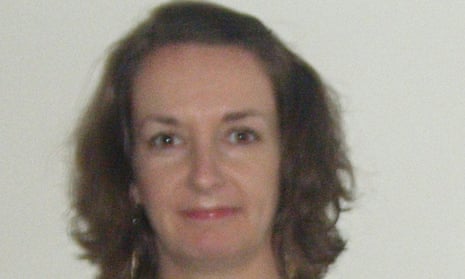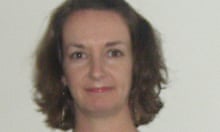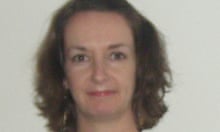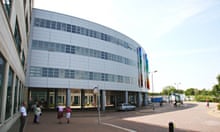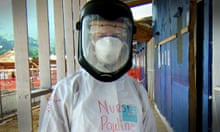The condition of the British nurse diagnosed with Ebola has deteriorated and is now critical, the Royal Free hospital in north London has said.
Pauline Cafferkey, a Scottish public health nurse who had been volunteering in Sierra Leone, was diagnosed with the virus after returning to Glasgow via Casablanca in Morocco.
A brief statement on the hospital’s website said: “The Royal Free London NHS Foundation Trust is sorry to announce that the condition of Pauline Cafferkey has gradually deteriorated over the past two days and is now critical.” It did not comment further, but it is understood that the next 12 to 24 hours will be crucial.
Cafferkey’s worsening condition comes despite being diagnosed early and receiving treatment from some of the world’s foremost experts in infectious diseases.
Cafferkey, 39, was admitted to hospital in Glasgow on Monday morning after arriving at Heathrow airport the previous night.
Her change in condition comes just days after her doctor said she was sitting up, eating, drinking and communicating with her family. But Dr Michael Jacobs warned at the time that she faced a crucial few days while being treated with a survivor’s plasma and an experimental anti-viral drug that was “not proven to work”.
The Royal Free, where Cafferkey has been treated in isolation since Tuesday, was unable to obtain ZMapp, an experimental drug that has been used on other international Ebola patients, because it is no longer available.
A related drug, ZMab, is available and was provided to a senior doctor in Sierra Leone before Christmas, but he died before it could be administered.
Hugh Pennington, a microbiology expert, said on Saturday that luck will play a role in Cafferkey’s survival chances because experts still do not know enough about the virus. Pennington, who is emeritus professor of bacteriology at the University of Aberdeen, said: “The plasma is probably her best chance of treatment, as that is actual antibodies from people who have recovered from Ebola.
“Because of the small number of people treated with experimental drugs, it’s difficult to judge the percentage of success.
“We also don’t know the circumstances of the infection. That might be important.”
David Cameron tweeted: “My thoughts and prayers are with nurse Pauline Cafferkey who is in a critical condition with Ebola.”
Scotland’s first minister, Nicola Sturgeon, said: “Our thoughts continue to be with Pauline Cafferkey and her family during this extremely distressing time. I would like to thank all of the health professionals involved in treating Pauline, as they continue to show tremendous dedication and expertise.”
The Royal College of Nursing praised Cafferky’s bravery. Dr Peter Carter, chief executive and general secretary said she had shown “incredible courage and commitment to provide nursing care in Sierra Leone” and that it was “sad and distressing” to hear she was in a critical condition.
“The efforts of frontline healthcare workers like Pauline have been essential for containing the spread of Ebola even though it means they themselves face considerable risks. Their bravery and their compassion is inspirational,” he added.
The news comes as another person showing the symptoms of the disease was tested at the Great Western hospital in Swindon. South West ambulance service’s hazardous area response team took the person to hospital after they reported feeling unwell.
A spokeswoman for Great Western Hospitals NHS foundation trust said it was “caring for an individual with a history of travel to West Africa who is being tested for Ebola as a precautionary measure”.
“The Trust is awaiting the results of the sample, which is being screened for a variety of infectious diseases prevalent in the affected countries, one of which is Ebola.
“Local people, other patients or visitors to the hospital should not be concerned … The individual is being kept in isolation as a precaution until blood test results are available.
Cafferkey, from Glasgow, was one of 30 NHS volunteers who travelled to Freetown in November to work in the British-built Kerrytown Ebola treatment centre run by Save the Children.
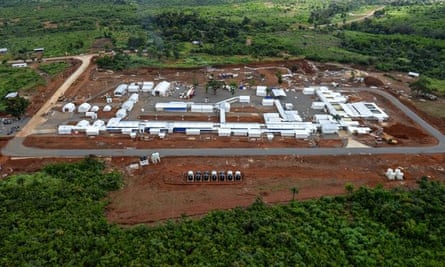
She flew from Sierra Leone via Morocco to London on Sunday, where she was considered a high risk because of the nature of her work, but showed no symptoms during screening and a temperature check at Heathrow.
While waiting for a connecting flight to Glasgow, however, she raised fears about her temperature and was tested another six times in the space of 30 minutes.
Despite her concerns, she was given the all-clear and flew on to Scotland where, after taking a taxi home, she developed a fever and raised the alarm. She was placed in isolation at a Glasgow hospital early on Monday, before being transferred to London on an RAF C-130 Hercules plane.
The government’s chief medical officer, Dame Sally Davies, said questions had been raised about the airport screening procedure for Ebola.
Cafferkey is the 20th patient to be treated for Ebola outside west Africa, where the World Health Organisation (WHO) says the disease has infected more than 20,000 people and killed more than 7,900.
Symptoms of Ebola can include fever, bleeding, vomiting, diarrhoea and central nervous system damage. There is no vaccine or cure and patients receive supportive care, including aggressive rehydration, antibiotics and anti-malarials. They can lose up to 10 litres of fluid a day.
It is not unknown for people in a critical condition with the disease to recover. Ian Crozier, a WHO doctor who contracted the virus in the same hospital as Pooley just weeks after he diagnosed the British nurse, was close to death before the virus changed its course.
Last month Pooley described flying to the US to donate his plasma, which contained antibodies to fight the virus. He said that when he arrived in the US, Crozier was fighting for his life on life support and dialysis machines.
After receiving Pooley’s plasma, the viral load almost immediately started to drop, doctors said.
Crozier nevertheless remained seriously ill and was in hospital for 40 days before being discharged. He told the New York Times that he still had a long road to full recovery, with physiotherapy necessary to rebuild his strength.
